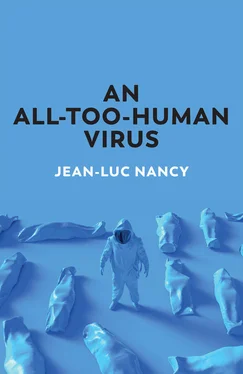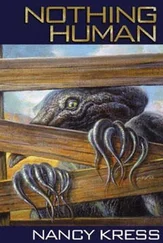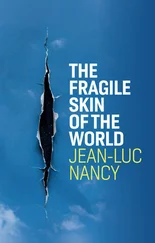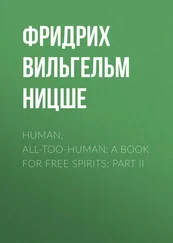This is also why it reveals, in a light that is harsher than ever, the exacerbated and unjustifiable gaps between regions, countries, classes and layers of a world that, in becoming more interconnected, is at the same time split asunder, torn apart by its own exponential growth.
Today, a few days after 15 August, in other words less than three months after the end of the lockdown in France, the resumption of the epidemic is already the subject on everyone’s lips; elsewhere in the world, above all in the United States and Brazil, it has raged even more than in Europe; just about everywhere, we keep watch, we measure, and we work to halt new developments. At the same time we are beginning to register the grave economic effects of the phenomenon.
The wait for an effective treatment has become so arduous that the head of state of ‘great Russia’ has judged it appropriate to pre-empt the laboratories by announcing the completion of a vaccine that is still in the test phase. Broadly speaking, heightened anxiety and feverish competition have combined to whet the desire for power. The virus catalyses forms of solidarity but also tensions, judging by the difficulties that Europe’s decision in favour of a joint aid package worth €500 billion (the implementation of which must still be overseen) has had to overcome. The telluric movements of global geopolitics are being felt in all their intensity, together with the no less telluric movements of technoeconomic powers.
Tellus , the Roman divinity of earth, also associated with the underworld, holds the powers of life and death.
*
2. The virus is single-handedly revealing a world that for a long time now has been feeling the distress of a profound mutation. What is at stake is not simply the organization of forms of domination: an entire organism feels sick. What is being called into question is an obstinate confidence in the belief in progress and in unpunished predatory behaviour – but without any new conviction arising about the possibility of inhabiting the world humanely.
Not so long ago, these words of Hölderlin used to come up often in learned discourse: ‘Poetically man dwells on this earth.’ We sought to find virtue in the precious sounds these words made in our throats. We almost always forgot to cite the entire sentence: ‘Full of merits, but poetically, man dwells on this earth.’ 1The ‘poetic’ is, if not opposed, then at least contraposed to the ‘merits’ of humans, namely their achievements and their acquisitions. The German word Verdienst has, first and foremost, the sense of ‘gain, profit’. If, already for Hölderlin, it is in spite of their exploits that humans live or can live in a poetic mode, we must say that, today, it is in spite of their poetic nature or vocation that humans lose themselves in the abundance of their conquests, with all their consequences: destruction, misery and aberrance.
The COVID-19 pandemic is merely the symptom of a more serious illness, which touches humanity in its very ability to breathe, in its capacity to speak and think beyond information and calculation.
It is possible that this symptom will make us see the necessity of combating the pathology beneath it, and will force us to go in search of a vaccine against the success and the domination of self-destruction. It is also possible that other symptoms will follow this one, up to and including the inflammation and the dying out of vital organs. This would mean that human life, like all life, is reaching its end.
1 1. Tr.: Friedrich Hölderlin, ‘In Lovely Blueness …’, in his Poems and Fragments, trans. Michael Hamburger. Ann Arbor: University of Michigan Press, 1968, p. 601; translation slightly modified in accordance with Nancy’s text (Hamburger translates voll Verdienst with ‘full of acquirements’).
Giorgio Agamben, an old friend, declares that the coronavirus scarcely differs from a normal case of the flu. He forgets that we have a vaccine for the ‘normal’ flu that has proved its effectiveness. It must still be adapted every year to viral mutations. For all that, the ‘normal’ flu still kills people – and the coronavirus, for which no vaccine exists, is much more likely to have a lethal outcome: proportionally (according to sources similar to those cited by Agamben), about thirty times more likely. The least one can say is that this is no minor difference.
Giorgio assures us that governments are looking for pretexts to introduce every imaginable state of exception. He does not mention that the exception becomes the rule in a world in which technological interconnections of all kinds (movements, transfers of all kinds, infusions or propagations of substances, etc.) reach a hitherto unknown level of intensity, one that increases along with the population. The growth of the latter in rich countries also involves longer lifespans and an increase in the number of elderly people and, in general, of people at risk.
Make no mistake about the target here: an entire civilization is at stake, there is no doubt about it. There is a sort of viral – biological, computerized, cultural – exception that ‘pandemicizes’ us. Governments are not the sad agents of this exception, and lashing out at them looks more like an exercise in diversion than real political reflection.
I noted that Giorgio is an old friend. I regret to bring in a personal memory, but in doing so I’m not departing, in essence, from a register of general reflection. Almost thirty years ago, the doctors said that I needed a heart transplant. Giorgio was one of the very few people who advised me not to listen to them. If I had followed his advice, I would undoubtedly have died quite quickly. Everyone makes mistakes. For all that, Giorgio’s spirit is no less endowed with a subtlety and a kindness that one can call – without the least bit of irony – exceptional.
February 2020
*
More than a year after our first exchange on the subject of what was not yet termed a ‘pandemic’ at that point, Giorgio Agamben and I have maintained our respective positions. Today he considers the vaccination to be a futile religion, while I see in it more of a combination of achievement and uncertainty – both technological – that corresponds to the general situation of the civilization from which the pandemic originated. I understand that Giorgio considers our society’s obsession with health to be pathetic. Like him, I have Nietzsche’s concept of ‘great health’ in mind. But when an entire civilizational organism is ill – and made all the more so by its obsession with health – it is understandable that it seeks a way out of the illness. Perhaps we will not find a way out, or will not do so unscathed – and this will perhaps present new opportunities. But the already ancient critique of religion, however it might be formulated, has not yet managed to bring about a new civilization.
April 2021
As has often been said, Europe exported its wars after 1945. Having destroyed itself, it didn’t know what to do other than spread its disunion through its former colonies, in accordance with its alliances and tensions with the world’s new poles of power. Between these poles it was no more than a memory, even though it pretended to have a future.
Now Europe imports. Not only merchandise, as it has done for a long time, but first and foremost populations, which is not new either, but is becoming urgent, and indeed overwhelming, at the same rate as exported conflicts and climatic turmoil (which were born in this same Europe). And today it has come to import a viral epidemic.
What does this mean? Not only the fact of a propagation, which has its carriers and its routes. Europe is not the centre of the world, far from it, but it is doing its utmost to play its old role of model or example. There may be strong attractions or impressive opportunities elsewhere: traditional ones, at times a little worn out, as in North America, or newer ones in Asia and in Africa (Latin America is different, having many European characteristics that are mixed with others). But Europe seemed to remain desirable, or more or less believed itself to be so, at least as a refuge.
Читать дальше












